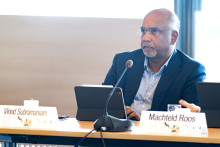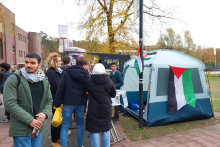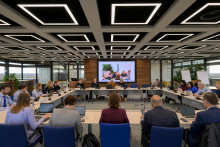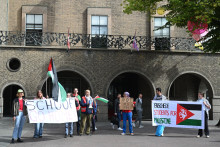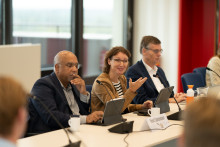The Executive Board took the University Council through the state of affairs, in response to large-scale protests at other Dutch universities and the open letter sent by action group Enschede Students for Palestine last Monday. That open letter has now been signed by almost four hundred sympathizers.
'Call to action, not demands'
President of the Executive Board Vinod Subramaniam and Rector Tom Veldkamp will talk to the action group on Tuesday, Subramaniam told the University Council. Subsequently, the President of the Executive Board shared his view on the situation, both at global, national and UT level. ‘What is happening in Gaza is a humanitarian disaster. I think we all feel deep anguish over the tragedy of the last few months. We also see at the national level that every university is working on it. It's an issue that concerns our communities, both students and staff. We have empathy for the prevailing feelings. At the same time, we are also seeing violent demonstrations. Such a thing is an unacceptable expression of the fundamental, fundamental right to protest.’
And the situation at the UT? Unlike other Dutch universities, there were no occupations and evictions here. Subramaniam said the Executive Board is studying the activist group's open letter. 'I see the letter as a call to action rather than hard demands. We're going to see what we can do. The bottom line is that we want to stay in connection with a community that expresses its concerns. We stand for that dialogue.'
'Polarisation and isolation won't solve anything'
But giving in, for example, to the demand – or call to action – to sever ties with Israel-affiliated institutions and companies is going too far, according to the President of the Executive Board. 'Severing ties is a very radical step. We need to study thoroughly what is possible and what makes sense. And making an inventory of what ties there are – since they seem to be very limited as far as we can tell.' 'Polarising and isolating is not going to solve anything', Rector Tom Veldkamp added.
The Executive Board wants to deal with the situation and the emotions of the community 'step by step'. 'Doing nothing is not an option. But I don't know exactly what we need to do at the moment,' says Subramaniam, who pointed out that there should always be room for dialogue and debate at a university. 'It's a place where you can easily fillet someone with arguments based on facts. As long as you do so in a respectful manner. You can completely disagree with each other, but you have to keep talking to each other.'
Call to the University Council
Notable was an appeal by the President to the University Council to share their views on the issue and how the UT should deal with it. 'I would like to know what you think about it, as students and staff and as elected representatives on behalf of this university.'
Even more striking was that it remained eerily quiet after that. University Council chairman Herbert Wormeester raised some questions and concerns about safety during the Batavierenrace that will take place next week. He also asked whether the Executive Board would organise a discussion on the Israel-Palestine conflict. Subramaniam saw this as an invitation to organise such a meeting together with the University Council.
But the student factions in particular remained deafeningly silent. Only employee Pieter Boerman concluded with a 'wholehearted' statement of support for the Executive Board: 'I fully support how you are handling the situation. I wouldn't want to be forced by those around me to choose a side in a conflict. I like to see a nuanced dialogue in a respectful manner.'


